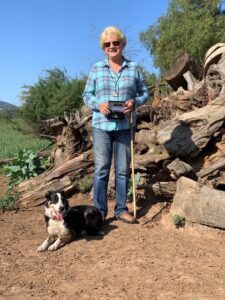From Wilda Bahr
Wilda has been trialing sheepdogs for many years. Competing with her own line of dogs that goes back generations, she has found success all around the country. Wilda travels extensively with her string of talented dogs and can be found teaching other hands and training dogs when at home. Wilda is a highly respected handler and judge and is always ready with inciteful advice and an encouraging word for others. One of the first things you’ll notice about Wilda when you meet her is how well turned out she is. The woman has style! And if you are lucky enough to call her friend, you are very lucky indeed.

Wilda has this to say:
When I started trialing, my very first trial was the one at which the Purina Award — for the top herding dog of that year — was presented. All the big handlers were there, and a lot of people. This was the first trial I had ever seen, and I went knowing I had the smartest dog ever. Well, after watching the open dogs run, and seeing Bill Berhow run a brace, I was sick. How could I go out in front of all these big handlers? I sat there all day getting more and more nervous. Soon it would be the novice-novice handlers and everyone would be watching. I spent time in the Porta-Potty, mostly being sick and crying, knowing I would be up in front of everyone. I finally came out of the Porta-Potty, and to my surprise. everyone was gone. Just us six novice handlers. What a relief!!!
For years, though, I would go to the post and my hands would shake. Then someone told me, “Just remember, no matter what your dog does wrong, someone else has had that experience too. You are not the only one to have a dog cross, to lose your sheep back to the set out with your dog attached, or to end up with a score of 32 out of 90. And remember, every one of your fellow handlers is hoping you’ll do well and is ready to help you any way they can.” I can’t say that this instantly solved the problem of my shaky hands at the post, but I have found it to be true. Other handlers are generally quick to commiserate if you’ve had an unlucky run and most will freely give advice when asked.
This is a tough sport. We have dogs, sheep, and our own mistakes to deal with. My view is that the mistakes our dogs make are easier to fix than the ones we make. The two most common handler mistakes, I think, are first, watching the dog rather than the sheep, which leads to the second, being late on whistles or commands. Fixing these mistakes requires a lot of concentration, and practice at trials. With patience and maybe a little luck, we have a good run and are ready to try again. Be kind to yourself, appreciate your dog , ask questions and have fun. Hope springs eternal!